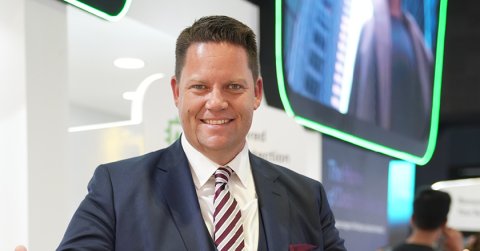
At GITEX 2025, Tim Pfaelzer, Senior Vice President & General Manager – EMEA, Veeam, told Veronica Martin how the company proritises the region’s key markets and industries, always ensuring enterprise-scale data resilience, and leveraging AI to strengthen security and compliance.
Which three countries and two industries in the region will you prioritise this year, and what are your goals for these countries and industries?
In the region overall we’re very active – including here in Dubai and across the Emirates – but another key focus nationally is Saudi Arabia. We’re also seeing a lot of emerging businesses coming up in Egypt and neighbouring regions, but I would say the biggest investment focus right now is in KSA. The reason for this interest is simple: the GCC is extremely advanced in terms of forward-thinking and innovation. You can see it at events like this – every company is here with an idea of how to move things forward, digitalise processes, operationalise IT, and embed technology into daily work and life.
All of these factors are coming together in Saudi, where we see significant investments aimed at building the next level of the country’s future. Global players like Novo, Google, Microsoft, and others are all active here, making it a strong market for us as well. We’ve been operating in the region for many years, but currently, there’s a big surge in demand, and it’s an exciting time to be part of this growth.
What recovery time and data-loss targets can Veeam achieve today at an enterprise scale, and can you cite one recent EMEA incident where you demonstrated it under real attack conditions?
There are multiple factors coming together. First is enterprise scale. What defines enterprise scale is the ability to handle a multitude of data points across diverse storage options – whether that’s hyperscalers, on-premises systems, or outsourced environments.
In our recent ransomware report, we surveyed hundreds of customers and found that 92% are using more than one cloud – and that’s just for cloud storage. On top of that, there’s the on-premises data, so managing this highly diverse data landscape is a major challenge.
At Veeam, with the Veeam Universal License, and the Veeam Data Platform, we ensure that all these data points are captured and connected. The goal is to provide full visibility through a single pane of glass, giving enterprises a unified view of all their data across environments.
In terms of reliability, our customers typically experience 99.79% data safety, meaning their data is well-protected against unauthorised access. At the same time, we operate at global enterprise scale, serving over 67% of the Global 2000 and generating more than 50% of our revenue from enterprise clients.
Of course, data breaches can still happen. While we cannot always cite specific names, these events do occur globally, including in this region. The critical point is that when our customers are affected, they can recover their data very quickly, often in less than one day, restoring full functionality. In comparison, competitors’ solutions might take three to five days.
To put that into perspective: one of our large consumer industry clients loses over $1 billion per day if production stops. With our solutions, they can resume operations within a single day, dramatically reducing the financial and operational impact.
That’s the essence of enterprise-grade scale: handling vast, complex environments while ensuring security, visibility, and rapid recovery.
AI is speeding up both attacks and defences. What near-term changes would you recommend to help customers reduce risk without adding complexity?
AI adds complexity because, naturally, security and AI intersect in multiple ways. On one hand, embedding AI can enhance security – proactively scanning networks, validating data, and making recommendations to improve your overall security posture. On the other hand, threat actors are also leveraging AI to breach data, impersonate users, and stay ahead of defenses, so AI and security are increasingly crossing paths, and that’s where our focus lies.
We use AI to make systems more secure, and we’re working closely with Microsoft through a partnership to develop the next generation of our product, integrating AI-driven capabilities like Copilot. When customers use our tools, AI prompts guide them on the best security configurations for their environment.
At the same time, we remain mindful that AI can also be used to generate attacks, so our approach balances innovation with caution. Ultimately, our goal is to ensure that wherever your data is and however it’s used, it remains secure.
Many firms feel ‘locked in’. What are your most straightforward steps to keep data portable across clouds and countries while controlling cost and compliance risk?
That’s a very good question, especially in light of the recent Broadcom news with steep price increases. For VMware solutions, it’s more important than ever for customers to move seamlessly between hyperscalers and hypervisors. Data portability is key.
This is where data sovereignty comes into play. Many organisations want their data stored only in their country, on their premises, or in a specific cloud. The Veeam Universal License and Veeam Data Platform address this by ensuring there’s no vendor lock-in. You can keep your data with Vendor A today, then move it to Vendor B, C, D, a different cloud, or a different hypervisor, all supported without extra cost. If you have a Universal License, you can use it anywhere your data needs to go.
Of course, when transferring data, you must adhere to data sovereignty requirements and certifications. We’re DESK-certified in Dubai and hold multiple industry-leading certifications globally, ensuring full compliance.
Data sovereignty isn’t just about storage – it’s about building trust with your customers. It’s about controlling who has access to data, how it’s used, and ensuring it’s protected. With our solutions, we make sure your data is secure, portable, and recoverable, no matter where it resides or where it moves.
What will you demonstrate live at GITEX that proves faster, cleaner recovery and easier portability, and what regional outcomes do you foresee?
When we talk with customers, what we consistently hear is that they want future-proof tools; they want solutions that ensure data security, portability, and resilience over the long term. For us, ‘future-proof’ means giving companies the confidence that they are mature, resilient, and prepared for any stress or potential attack.
To help with this, we’re showcasing our Data Resilience Maturity Model (DRMM) here at the booth. Yes, it’s a complicated name, but it’s powerful. We developed it in partnership with MIT, McKinsey, Microsoft, Splunk, Palo Alto, and others, asking our customer base to evaluate their practices across technology, people, and processes.
The model helps organisations assess three key areas:
- IT investments – do they have the right infrastructure to defend against attacks?
- Processes – are procedures in place to respond effectively?
- People – does everyone understand their role and ownership when an incident occurs?
The outcome is a multi-part assessment that shows companies where they stand across four resilience levels. Most companies fall at level 1 or 2, while only 8% reach level 4, the highest. From there, organisations can follow a step-by-step roadmap to improve their resilience.
This isn’t just a Veeam initiative; it’s an industry-wide standard, which is why MIT, Microsoft, and McKinsey were involved. By adopting these practices, companies can transform backup from a necessary task into a key part of a resilient strategy, ensuring they remain operational and minimise downtime.
Image Credit: Veeam





